Sometimes, there can be a very thin line between leading a healthy lifestyle and becoming obsessed with fitness and dieting. One study shows that a whopping 28.8 million Americans will have an eating disorder in their lifetime. Social media platforms can be especially rife with dangerous content from self-proclaimed fitness coaches and dieting experts.
Recently, body-positive creator Emily Jade Bispo called out one influencer for her obsession with working out even when feeling under the weather. She explained how harmful such promotion of toxic dieting culture can be to young and impressionable people, both psychologically and physically.
More info: TikTok
A woman recently made a video saying that having a cold and her period doesn’t stop her from working out
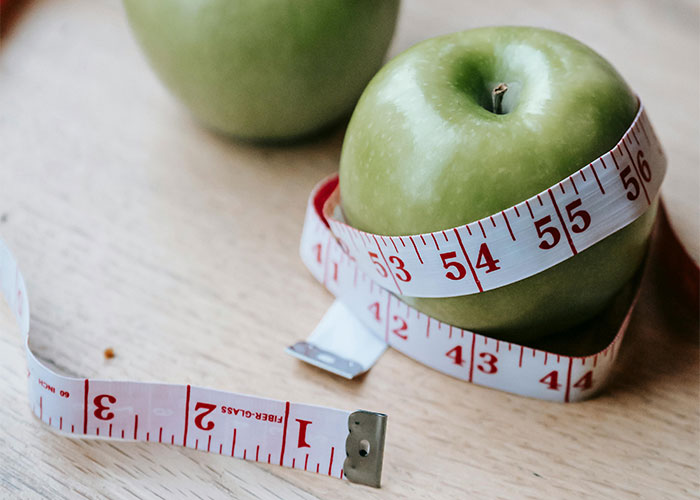
Image credits: Andres Ayrton / pexels (not the actual photo)
A body positivity advocate, Emily Jade Bispo, called out the fitness influencer for promoting toxic diet and gym culture
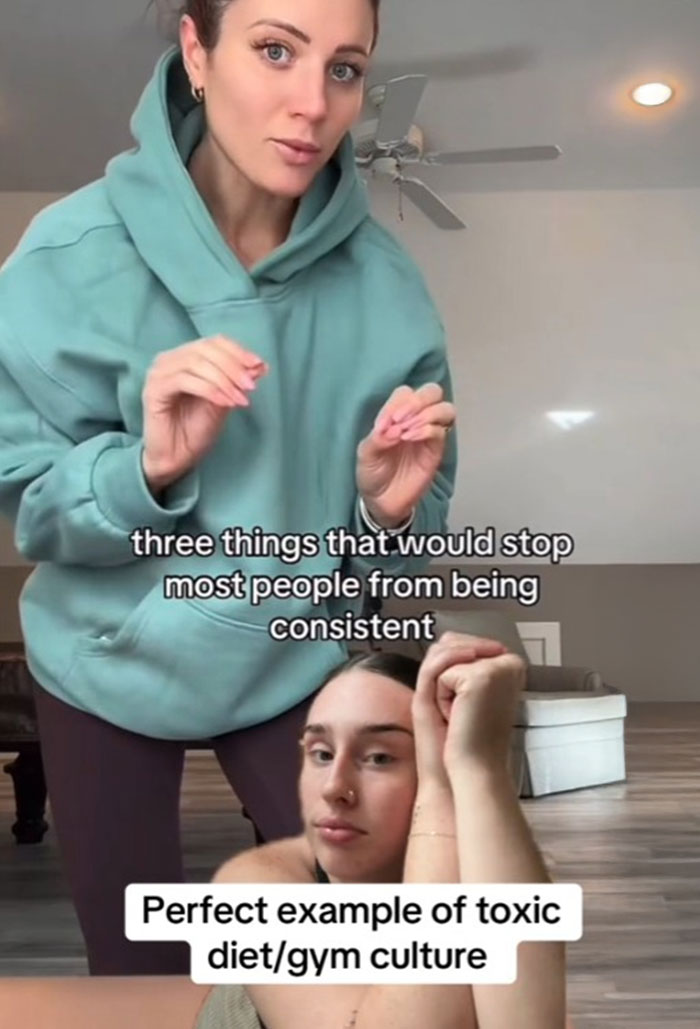
Image credits: emilyjadebispo


She said that this type of antagonistic ‘motivation’ only exists in the ED community
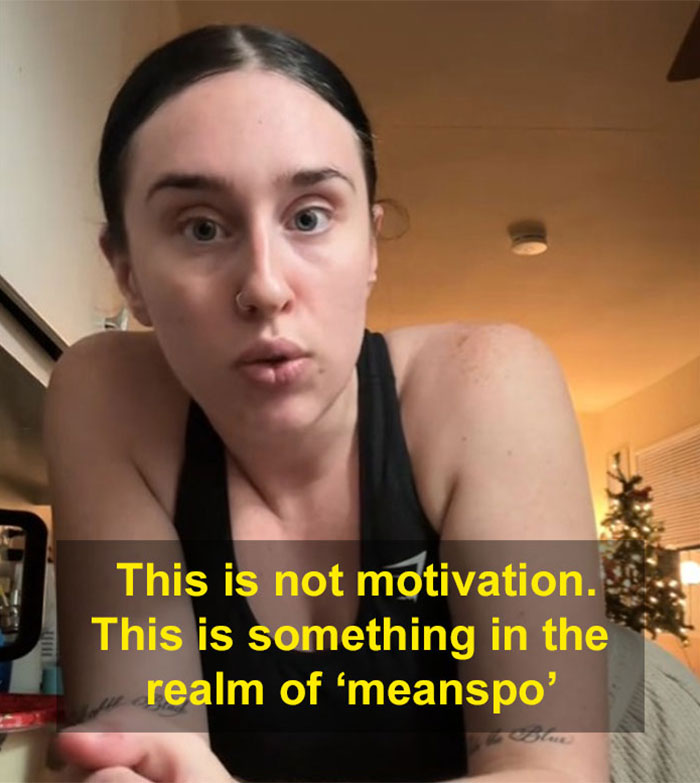
Image credits: emilyjadebispo


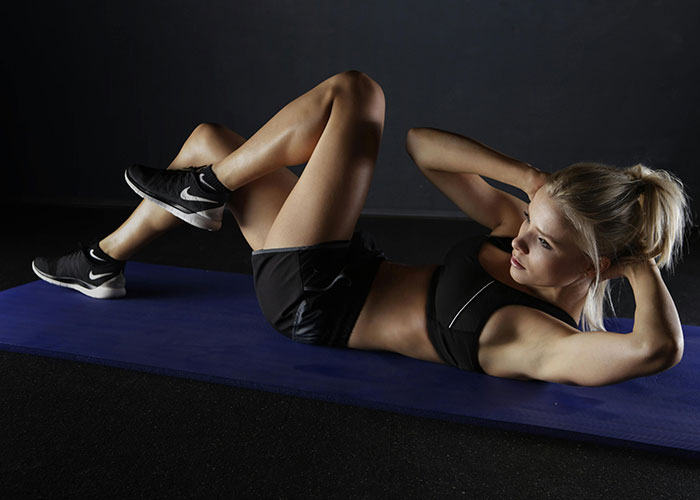
Image credits: Pixabay / pexels (not the actual photo)


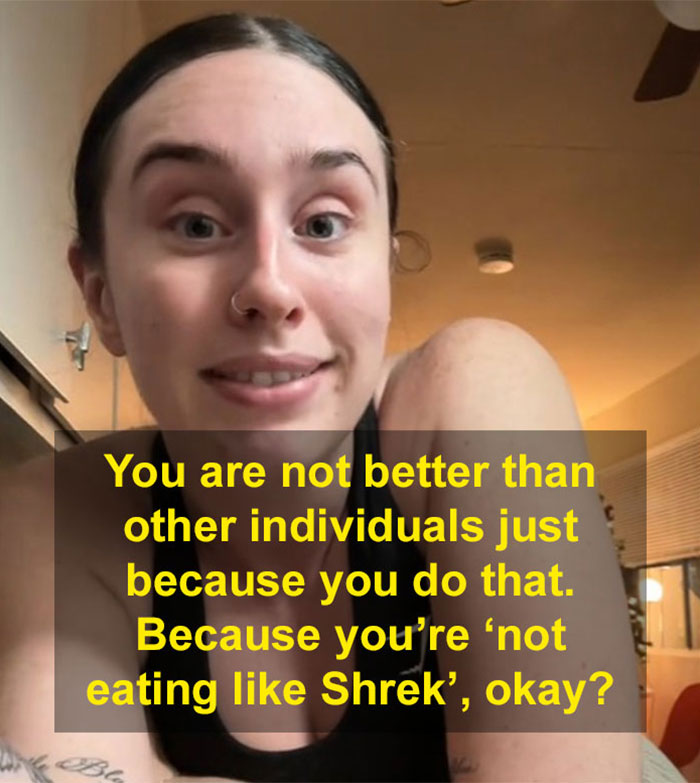
Image credits: emilyjadebispo

Image credits: emilyjadebispo
More than 800k people watched Emily’s video
@emilyjadebispo I swear some of yall are genuinely sick and are disguising it as wellness culture or being “disciplined”. Living a balanced lifestyle is way more attainable for individuals looking to change their habits. This is just sad. #dietculture #bodypositivity #gymtok #fitnessjourney #selflove #selfacceptance ♬ original sound – emilyjadebispo
Mild workouts are generally okay when you have a cold or are on your period
The woman who posted the original video is Amanda Dobler, a fat loss and mindset coach. In the video, she says some things that alarmed some viewers: she claimed that having a head cold or being on your period shouldn’t stop you from staying consistent with your workouts.
That’s true, but only to an extent. According to the co-director of the Mayo Clinic Sports Medicine Center and a professor at College of Medicine, Mayo Clinic, Edward R. Laskowski, M.D., mild to moderate physical activity is okay when you have the common cold and no fever.
The general rule is that if your symptoms are “above the neck,” meaning a runny nose or a sore throat, exercising is generally okay. If the symptoms are “below the neck,” like chest congestion, an upset stomach or a hacking cough, it’s better to refrain from strenuous physical activity.
Still, Dr. Laskowski recommends taking it easy. “Let your body be your guide,” he writes. “If you feel miserable, take a break. A few days off from exercise when you’re sick shouldn’t affect your performance. Resume your normal workout routine gradually as you begin to feel better.”
As for working out during menstruation, it even may have benefits. Doing some light exercising such as taking a walk, light cardio and gentle strength training exercises, and yoga, pilates, or tai chi can help alleviate cramps, bloating, or nausea. It can also help reduce irritability and fatigue, but the general rule, again, is to not overdo it. If pain increases or you feel discomfort, fatigue or nausea, experts recommend to stop and rest.
Misinformation about fitness and nutrition runs rampant on TikTok and other social media platforms
Not everything Dobler said is untrue, but it’s more about how she worded it. Using phrases like “Eating like [freaking] Shrek” and “The reason why you’re fat is because you don’t try hard enough” sounds more like bullying than motivating.
Body positivity advocate Emily Jade Bispo, who reacted to Dobler’s video, referred to her motivation methods as ‘meanspo.’ That’s a term people use to refer to antagonistic motivation to lose weight. The amalgamation of “mean” and “inspiration,” it’s often used in the ED community to motivate people to lose weight with mean comments and borderline bullying.
In reality, a lot of the content around exercising and nutrition on social media platforms like TikTok perpetuates toxic diet culture, especially among teens and young adults. A 2022 University of Vermont study found that weight-normative messaging dominates TikTok.
Researchers claim that a lot of the content positions weight as the main indicator of a person’s health. Creators glorify weight loss and position food as a means to achieve health and thinness.
Senior researcher and associate professor and director of the Didactic Program in Dietetics at UVM Lizzy Pope says that this type of content leads young people to adopt harmful ideas about body image. “Each day, millions of teens and young adults are being fed content on TikTok that paints a very unrealistic and inaccurate picture of food, nutrition and health,” she explained.
The researchers at UVM think that we should move away from a weight-normative mindset and look at dietetics with a weight-inclusive approach. “Just like people are different heights, we all have different weights,” Pope added. “Weight-inclusive nutrition is really the only just way to look at humanity.”
People in the comments were glad someone is calling out the influencer: “Bullying in fitness is so toxic”























!["[T]he First and Fifth Amendments Require ICE to Provide Information About the Whereabouts of a Detained Person"](https://images.inkl.com/s3/publisher/cover/212/reason-cover.png?w=600)


